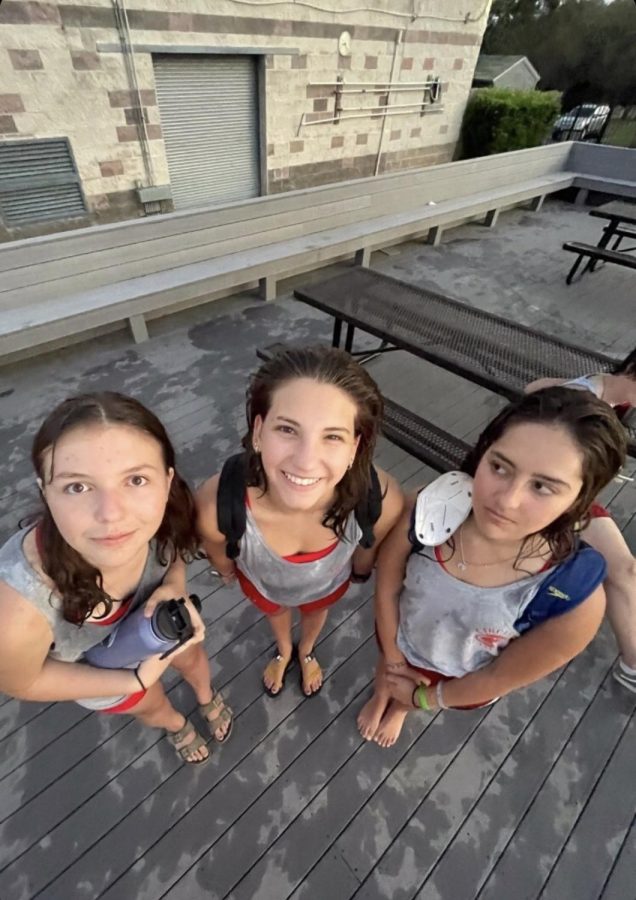Lifeguard duty makes a splash amid COVID shortages
Photo courtesy of Mia Schwartz
FRESH OUT OF THE POOL: Sophomores, Mia Schwartz, Lily Florence, and Gabby Clopaski wrap up their shift at the Circle C community pool. Schwartz started lifeguarding last summer and feels that this experience brightens her summer.
June 6, 2022
Overlooking the blue water, blazing summer sun beating down on her, student lifeguard Scarlett Crabtree sits in her chair surveying the scene below, ready to jump in or blow her whistle if necessary.
As the summertime quickly approaches, many teenagers have found work at their local community pools by becoming a lifeguard. In recent years, many community pools have faced lifeguard shortages. These shortages , as reported by KVUE news started in March 2020 when the city of Austin stopped hiring lifeguards for their local pools due to the COVID-19 pandemic. Hiring restarted in March 2021, however, according to Parks and Recreation, COVID-19 has limited the amount of lifeguards who can be trained at one time, to ensure the safety of the potential employees.
“I decided to become a lifeguard because I thought it would be an easy and fun job especially for the summer,” sophomore Crabtree said. “My favorite part is being able to socialize with a lot of nice people.”
Sophomore Mia Schwartz also became a lifeguard after completing the training over spring break to prepare for the test. The training didn’t prove to be too difficult for Schwartz, due to her previous extensive experience in the water.
“I decided to become a lifeguard because I am already on the swim team, so I’m a good swimmer, and was looking forward to a job involving water,” Schwartz said. “My favorite part is being able to say I’m certified and keeping cool outside by the pool.”
Lifeguarding also requires attentiveness and the ability to spend long hours closely watching the swimmers, in order to keep them safe. Crabtree emphasizes the laid back nature and long length of the majority of her shifts.
“Most shifts are pretty easy. You get on the stand and just make sure people are being safe,” Crabtree said. “The most difficult part is staying alert for long periods of time.”
Schwartz confirms that the alertness required to be a lifeguard is undoubtedly one of the most difficult parts, especially during times when the pool is crowded.
“The most difficult part is when the pool is really busy and you have to pay close attention to the busy water,” Schwartz said. “Or when it’s super hot and you just have to sit outside for long periods of time.”
Due to the intense and altruistic nature of lifeguarding, potential employees must go through intensive training to determine if they are fit for the job, and prepared to take the necessary steps to help someone in danger. One of the main parts of training to become a lifeguard requires becoming certified in multiple life-saving skills. Schwartz recalls the process of learning these different skills.
“The training process was about a week and I decided to knock it out during spring break,” Schwartz said. “It included water training, out of water with facts and information, and CPR training.”
Crabtree went through a similar process and also describes the timeline of the typical training for lifeguards.
“First, you had to do the prerequisite class,” Crabtree said. “Then you had to do about a week of training before the official lifeguard tests.”
Just like any other jobs that involve interacting with and observing other people, Schwartz attests to how lifeguarding can also lead to being a witness of numerous memorable situations and interesting stories.
“This one family had lost a pair of diamond earrings in the water,” Schwartz said. “We got in and swam looking for it and eventually found it.”
In addition to stressing the importance of staying in shape for the job, Crabtree encourages others to apply to be a lifeguard during this time of shortage, emphasizing that the job, although sometimes stressful, can be fun.
“Make sure you are fit and active,” Crabtree said. “Lifeguarding is really fun and they’re trying to find a lot of people so they would most likely take you.”
Schwartz is in agreement and also attests to the many benefits of lifeguarding. She urges others to consider the job opportunity because of how enjoyable it can be.
“Do it,” Schwartz said. “It’s so much fun and if you like being outside it’s great.











Amy Saunders • Aug 12, 2022 at 1:44 am
To reiterate what you’ve shared in the article, it’s obviously compulsory for any lifeguard to be highly vigilant and alert so they can detect any early signs of danger. My son has been thinking of spending his summer break by doing some volunteering work by the beach. I believe this piece of information would convince him to reach out to the right organization straight away. https://lifeguardstaff.com/class-information/